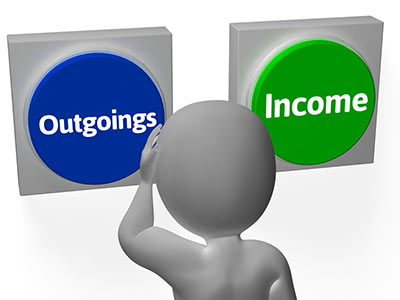
OK, so seriously. Why Budget? One constant theme in LifeSkill Secrets is that you cant get where you want to go if you don’t know where you are now. Building a budget starts with knowing where you are right now with money. Money is not the enemy. Its just a means to get you what you want from life, so its good to know your starting point. This budget overview will help you understand how knowing where you are with money and where you want to be will help you achieve your dreams.
Money In and Money Out
Basically there is money in (income) and money out (spending). You cant spend more than you have (in spite of what credit cards may lead you to believe).
The steps to your budget overview are:
- Track and understand all money you have coming in (income)
- Track and understand all money you have going out (spending)
- In case of doubt, overestimate spending and underestimate income
- Figure out how you can spend less
- Identify what you need to save to accomplish goals
- Identify if you need to make more money
1. Start by Knowing What Your Income Is
This is easiest if you have a regular job and make a salary, or even if you are paid hourly and usually work the same number of hours each week. It gets harder if your income varies. In any case, determine monthly income. If it varies, look at your deposits or pay stubs for the last month (or start now and pay attention and keep records for the next few months) and write down what you make after taxes. If your income varies a lot from month to month, try to determine what is the least it might be, the most it might be, and, if possible, any monthly variations. For example, is summer usually less income than the rest of the year? If so, by how much?
2. Know What You are Spending
At the same time, start keeping a record of all your expenses. Yes, I know. Its a pain, but you can’t start to know how much you need to make if you dont know what your basic expenses are. Start with the ‘have to pay’ things. For many, this is utilities like gas, electric, cell phone, rent or mortgage, insurance, cable and/or internet and so on. Click this link for an excel worksheet to get you started tracking expenses and income. (If you are concerned about viruses, scan it here at virustotal.com. This is a good resource to bookmark anyway to use any time you download something. Scan the file -up to 128MB – before you open it. I scanned this and it was free when I uploaded it, but you just never know.)
3. Basic Rule of Budgeting: Overestimate Outflow and Underestimate Income
Since the idea is to have enough to get to cover the expenses, always follow this rule so you dont come up short. IF your electric bill can be as high as $200 in the summer, plan on that. If your income can be less due to seasonal fluctuations, assume it will be the lowest amount.
Its also a good practice to determine when you have to pay which bills. I personally pay bills on the 1st and the 15th of each month. Its on my calendar. Anything that is due on the 6th to the 14th gets paid on the 1st and any bills due on the 20th to the 5th get paid on the 15th. I keep a notebook that has a page for each month showing the 1st at the top of the page and lists those that I pay on the fist, and halfway down has the 15th and the bills I pay then. That way I dont get caught if I dont get a bill or an email reminder, and I always have funds for automatic withdrawals. If I know I always pay the water bill on the 6th of the month, its listed on the first.By doing this regularly I know how much I need and when.
Next post I will explain what you do with all the information you are collecting.

Leave a Reply